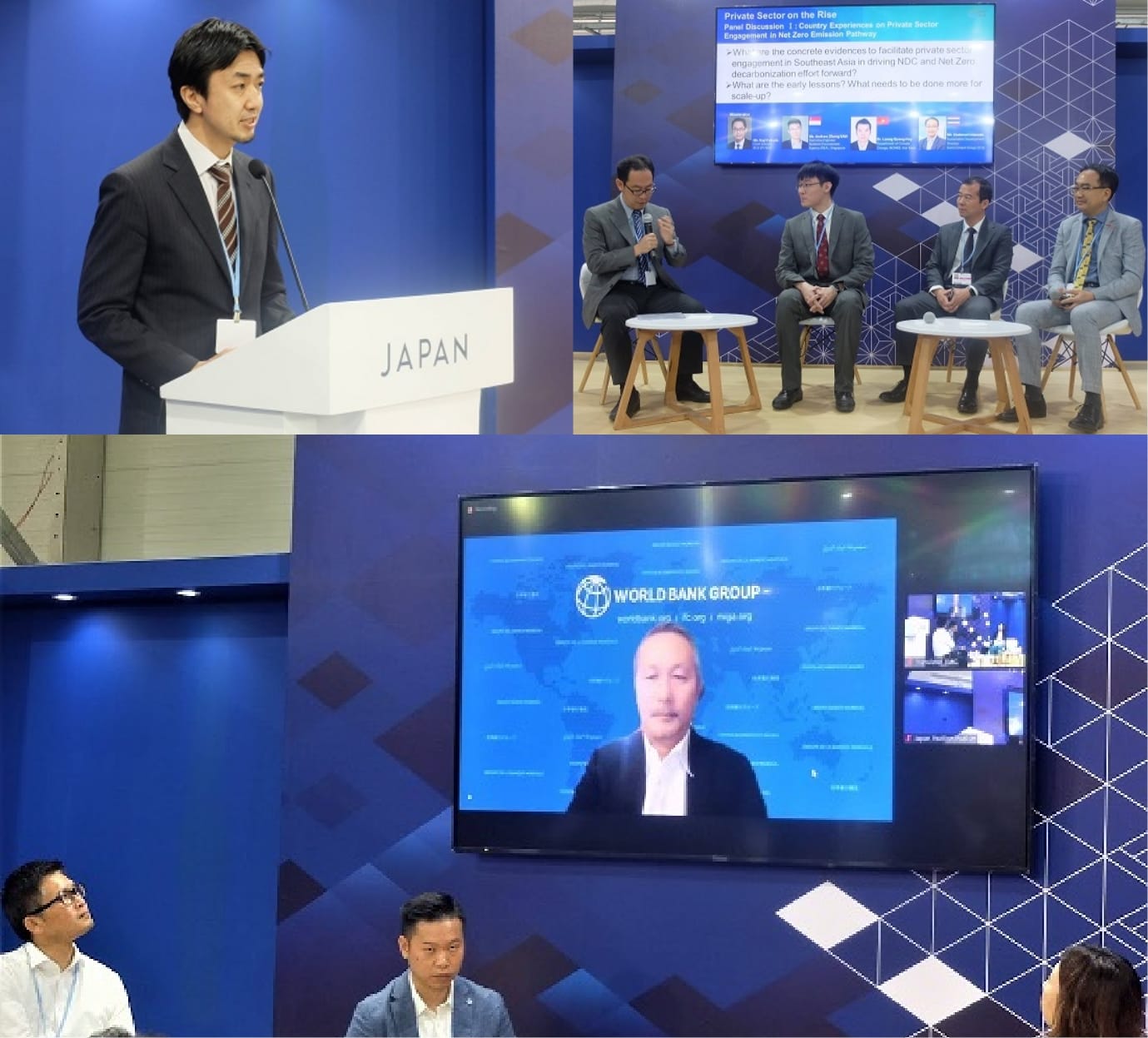2022.11.12 SAT
- 10:30 - 12:00
- Private Sector on the Rise -Forging Business-to-Government Partnership and Sustainability Reporting to enhance Corporate Efforts towards Net Zero Emission in Southeast Asia
- Organizer
- Private Sector on the Rise -Forging Business-to-Government Partnership and Sustainability Reporting to enhance Corporate Efforts towards Net Zero Emission in Southeast Asia
- Seminar abstract
- As we witness national effort to raise ambition level through committing long-term carbon neutrality target and updating/sophisticating the contents of NDCs accelerating, the real challenge remains how to effectively translate such ambitions/commitments into implementation.
It is no doubt that implementation requires wider engagement of multi-stakeholders beyond policy makers community, especially from private sector. While we observe increasing number of private firms join concerted efforts to prepare their own Paris-compliant corporate pledges and actions including effort to net zero emissions, achieving enhanced visibility of corporate climate efforts through fulfilling sustainability reporting requirement for the listed companies under country’s stock exchange also create additional impetus to encourage corporate actions.
This multi-stakeholder event focuses on private sectors in Southeast Asia, and invites communities of policymakers, private sector and practitioners to identify opportunities and challenges, and how the role of administrations, institutions, and enterprises can be best harnessed to unlock challenges to further leverage corporate efforts. The means to enhance access to resources by firms and aspiration for carbon market creation at regional level are also to be discussed.
- Speakers
- 【Local Speakers】
- Mr. Khoji Mitomori (Japan International Cooperation Agency, Global Environment Department ,Office of Climate Change ) Director
- Mr. Koji Fukuda(Japan International Cooperation Agency ) Support for planning and implementation of the Nationally Determined Contributions in Vietnam(SPI-NDC)、Chief Advisor
- Mr.Andrew Zheng Saw (National Environment Agency (NEA) , Singapore ) Executive Engineer
- Dr. Luong Quang Huy (Department of Climate Change, MONRE, Viet Nam ) Chief
- Mr. Nuttavut Intarode (Siam Cement Group (SCG)) Sustainable Development Director
- Mr. Makoto Kato(Japan International Cooperation Agency) Support for planning and implementation of the Nationally Determined Contributions in Vietnam(SPI-NDC)、Team Leader
- Mr. Zhibin Chen (International Carbon Action Partnership (ICAP) ) Senior Carbon Expert
- Ms. Maiko Uga(Ministry of Environment Japan , Global Environment Bureau, Office of Director for International Cooperation for Transition to Decarbonization and Sustainable Infrastructure) Section Chief
【Online Speakers】- Mr. Taisei Matsuki (World Bank, East Asia and Pacific Region, Environment, Natural Resources and Blue Economy Global Practice, ) Senior Climate Change Specialist
- Dr. Kazuhiko Takemoto(Over seas Environmental Cooperation Center (OECC)) President
- Session Summary
-
This regional dialogue focused on fast-growing South-East Asia and aimed to share experiences and contribute to mutual learning on policy approaches in middle-income countries to induce private sector participation in driving climate change action in the implementation phase of the Paris Agreement, together with corporate response efforts, including sustainability reporting. This event also discussed broadly the support and prospects for carbon pricing policy measures, which are gradually seeing institutional formation following the outcome of the Article 6 negotiations, with a focus on international development assistance agencies.
First, Mr. Mitomori, Director of JICA’s Climate Change Office, touched on the importance of implementation, introducing the importance of involving the private sector and JICA’s support through the Project for the Implementation of Nationally Determined Contributions (NDC) to the Paris Agreement (SPI-NDC), which encompasses this area. The JICA/SPI-NDC project expert followed with a presentation on the accelerating shift to decarbonization, especially since COP26, and the progress of domestic systems requiring companies in developing countries to reduce GHG emissions, as well as the need for the financial sector to meet requirements such as transparency through sustainability reporting as typified by ESG investment. He also mentioned that many international initiatives have been launched to encourage corporate action, but the environment is still in its infancy, and that carbon pricing as a price signal is being introduced and pilots actions are beginning to be implemented.
In the first half of the discussion session, Singapore explained the gradual development of the Carbon Pricing Act (CPA) , its policy timeline and outlook, and the importance of domestic stakeholder consultations and dialogue conducted by the government prior to the introduction of the system. Vietnam followed, touching on the GHG calculation and reporting requirements for specific business establishments under the revised Environmental Protection Law and its implementing regulations, and mentioned that the country is developing public-private partnerships with local associations of commerce and industry to disseminate the regulations and support business establishments in strengthening their capacity to comply with the regulations. From Thailand, the Siam Cement Group participated in the session, introducing the significance of the company’s contribution to social development through its proactive efforts to decarbonize and recycle resources from a corporate perspective.
In the latter half of the session, international organizations and development partners discussed carbon pricing support as a policy measure, with ICAP presenting the overall progress of carbon pricing in each country in the region, and the World Bank introducing its support and prospective. OECC then introduced Japan’s Asia Zero Emission Initiative and the many capacity-building support programs being developed in the region. The Ministry of the Environment of Japan explained the domestic operational results of the carbon tax and mentioned the launch of the JCM and the Article 6 Partnership in terms of international support.
Other timetable
2022.11.12 SAT
- 13:00 - 14:30
-
Sustainable agriculture and Food security projects by the Ministry of Agriculture, Forestry and Fisheries (MAFF) of Japan
Ministry of Agriculture, Forestry and Fisheries
- 15:00 - 16:30
-
Japan’s contributions towards a decarbonised and resilient Asia
Organizer: Ministry of the Environment, Japan
Co-organizers: Institute for Global Environmental Strategies (IGES)
National Institute for Environmental Studies (NIES)
Association of the Southeast Asian Nations (ASEAN Secretariat)
- 17:15 - 18:20
-
New Generation of Greenhouse Gas Remote Sensing Satellites for Contribution to the Paris Agreement
Satellite Observation Center (SOC)
National Institute for Environmental Studies (NIES)
